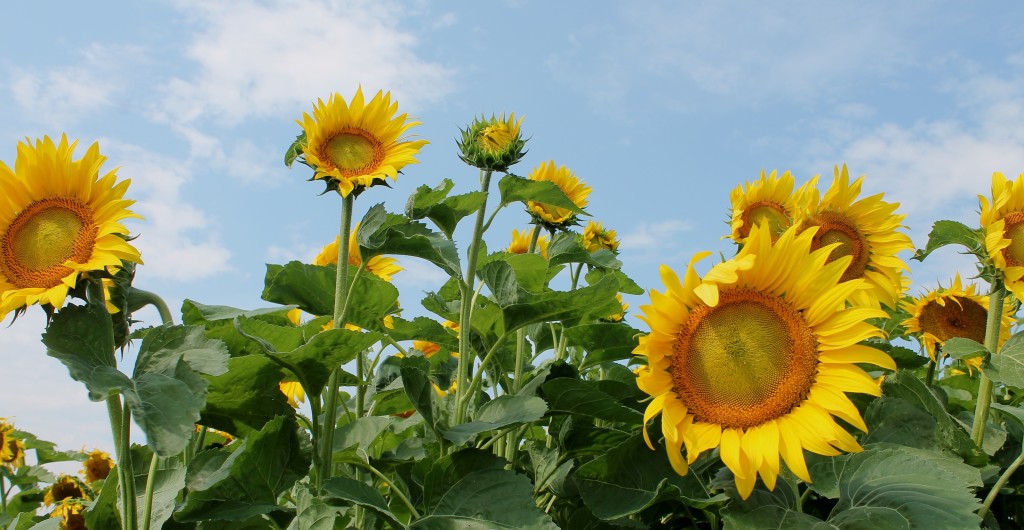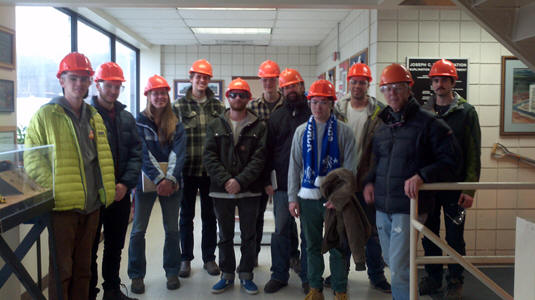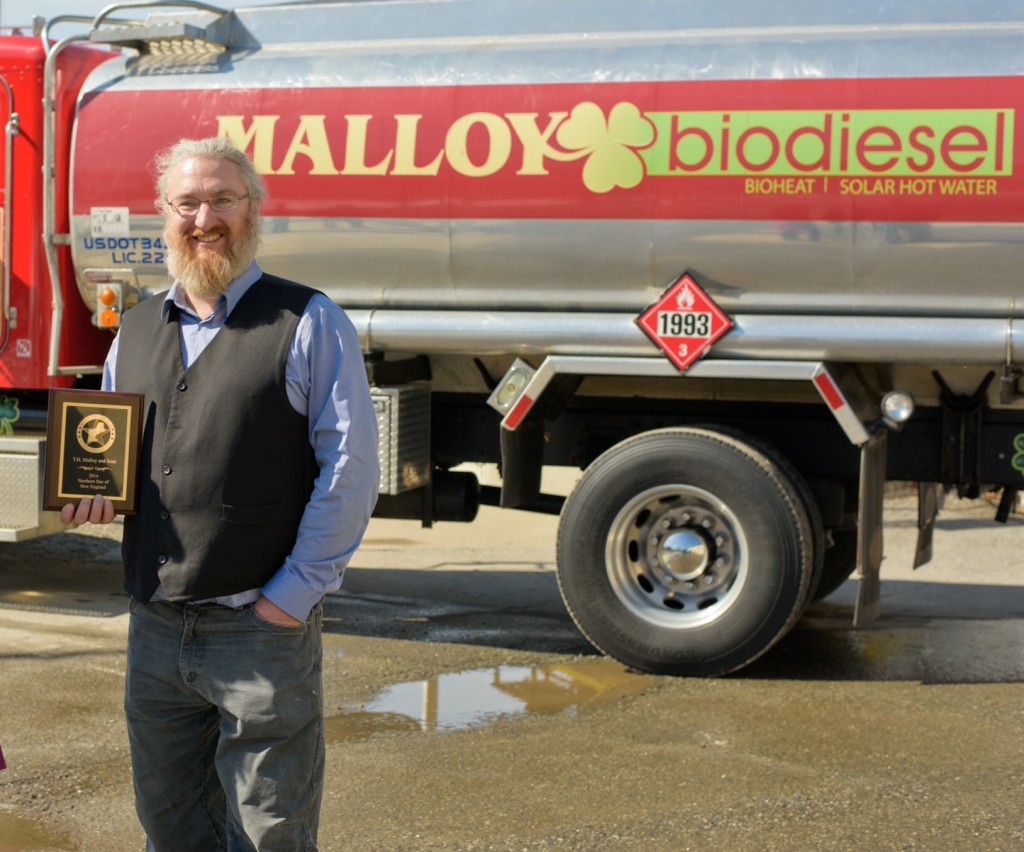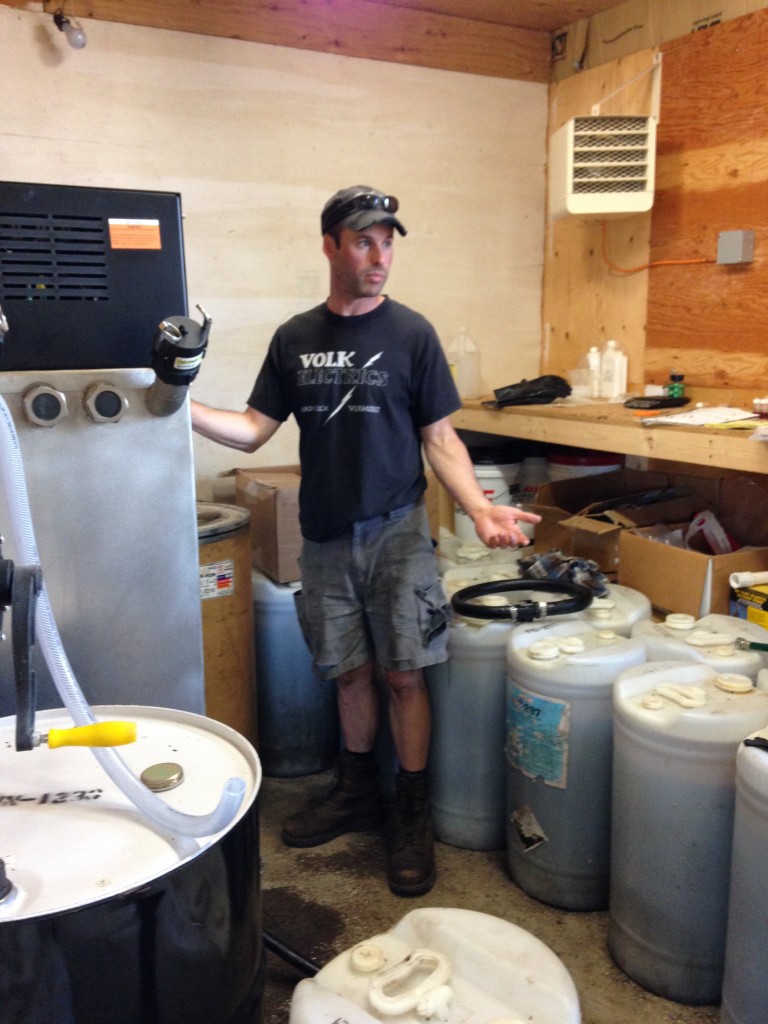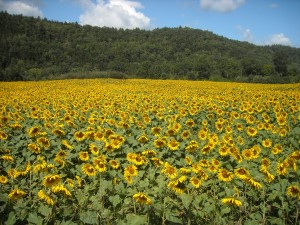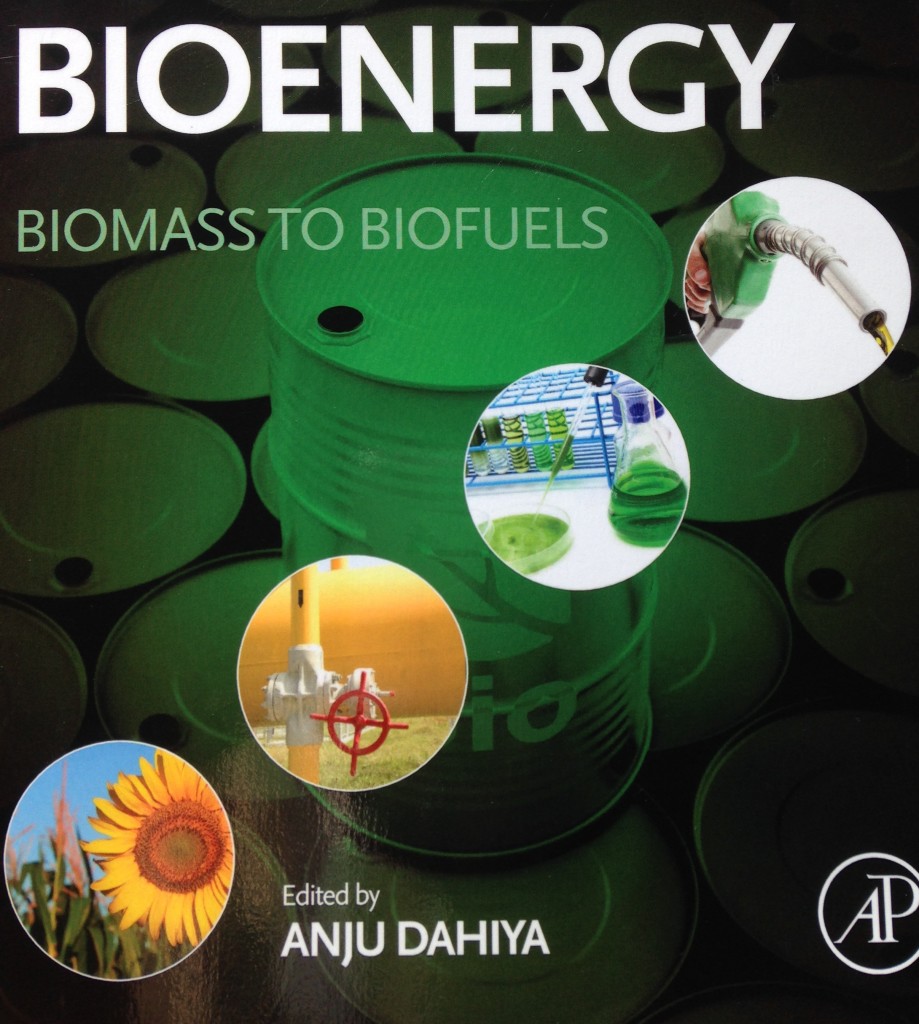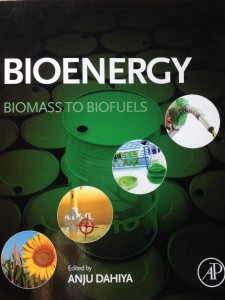19 May 2015
Mitigating Potential Biomass Feedstock Pests
The Vermont Bioenergy Initiative aims to connect diversified agriculture and local renewable energy production for on-farm and community use by supporting research, technical assistance, and infrastructure development in emerging areas of bioenergy including biodiesel production and distribution. As we move into the growing season, there are a variety of pests that can potentially affect sunflower, canola, and soybean biomass feedstock production. In this video a University of Vermont agronomist explains how to control theses potential biomass feedstock pests and increase crop, and eventually biofuel, yields without heavy reliance on pesticides and herbicides.
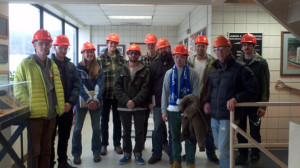 Coming this fall the University of Vermont will be offering a bioenergy course taught by Anju Dahiya, cofounder of General Systems Research, LLC, lead biofuels instructor at the University of Vermont’s Rubenstein School of Environment and Natural Resources, and Vermont Bioenergy algae for biofuel grant recipient. This course is open to both degree and non-degree students from any background or department, as well as farmers, entrepreneurs, and teachers interested in developing curriculum, or projects at school or college levels. This course is also approved for graduate credit.
Coming this fall the University of Vermont will be offering a bioenergy course taught by Anju Dahiya, cofounder of General Systems Research, LLC, lead biofuels instructor at the University of Vermont’s Rubenstein School of Environment and Natural Resources, and Vermont Bioenergy algae for biofuel grant recipient. This course is open to both degree and non-degree students from any background or department, as well as farmers, entrepreneurs, and teachers interested in developing curriculum, or projects at school or college levels. This course is also approved for graduate credit.
Potential participants are offered the option of variable credits, ranging from 0 to 6 credit hours. This allows prospective students to only attend lectures and have access to online course materials for 2 credits; further their experience with the addition of hands-on labs and field trips for 3 credits; or participate in all aspects of the class while additionally applying lessons to a service learning project with a community partner, earning 4 credits. Participants have the ability to add up to 2 more credits, totaling no more than 6, for additional work with the community partner pending special permission from the course instructor.
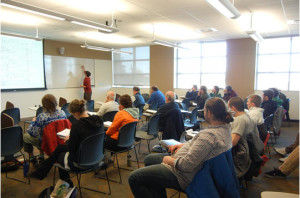 Lectures will be held twice a week between September 18th and December 9th of 2015. Friday lectures will be on campus from 4:05 pm to 7:05 pm, followed by Saturday morning field trips between 10:00 am and 1:00 pm for those students who elected for 3 credits or more. The course required textbook, Bioenergy: Biomass to Biofuels, was edited by Anju Dahiya less than a year ago and represents a compilation of work from an extensive list of well-respected university extension programs, such as The University of Vermont Research Extension, as well as numerous national organizations including the US Department of Energy’s National Renewable Energy Laboratories.
Lectures will be held twice a week between September 18th and December 9th of 2015. Friday lectures will be on campus from 4:05 pm to 7:05 pm, followed by Saturday morning field trips between 10:00 am and 1:00 pm for those students who elected for 3 credits or more. The course required textbook, Bioenergy: Biomass to Biofuels, was edited by Anju Dahiya less than a year ago and represents a compilation of work from an extensive list of well-respected university extension programs, such as The University of Vermont Research Extension, as well as numerous national organizations including the US Department of Energy’s National Renewable Energy Laboratories.
Learn more about this course at the University of Vermont Renewable BioEnergy page or email the lead instructor Anju Dahiya at adahiya@uvm.edu.
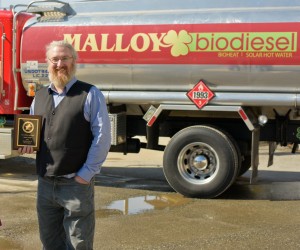
Jim Malloy, of Plainfield, Vermont, is recognized for displacing petroleum with biodiesel in New England’s transportation sector.
Jim Malloy, of Plainfield, Vermont, is being recognized for his contributions to reducing the use of petroleum fuel in the transportation sector. His business, TH Malloy and Sons in Newport, Rhode Island, is being recognized with the New England Northern Star Award as one of the top fleets for reducing their emissions through the use of biodiesel made from recycled restaurant oil.
The 75-year-old family business is a distributor for Newport Biodiesel, also of RI, who produces biodiesel from recycled restaurant oil. Both companies are being recognized with the award.
Each recipient of the award demonstrated a deep commitment to the goals of the Clean Cities program through use of alternative fuels, alternative fuel vehicle purchasing, and petroleum reduction practices. The designation as a Northern Star required that the fleets be a stakeholder in their local Clean Cities Coalitions and that they meet a list of criteria showing their commitment to Clean Cities’ initiatives.
Malloy introduced biodiesel fuel into his RI company’s distribution fleet and has helped 4,000 customers replace oil with biodiesel. His efforts have displaced nearly 4 million gallons of oil in the past seven years. Malloy is also being recognized for the impact he has had on reducing emissions statewide by working in the RI legislature to make biodiesel a more affordable fuel option.
Replacing petroleum fuel with biodiesel that is produced locally from recycled cooking oil has the benefits of increased energy security, stronger local economies, improved air quality, and reduced contributions to global climate change.
“I am honored to be recognized,” says Malloy. “I’m passionate about recycling waste and creating an outlet for less expensive and cleaner-burning domestically-made fuel that displaces petroleum.”
Malloy is also owner of Black Bear Biodiesel in Plainfield, Vermont, which is a two-year-old restaurant oil collection recycling service and biodiesel distributor serving northern and central Vermont. The company plans to have drive-up fill-up stations at their Plainfield location in late May.
“I look forward to bringing this same passion for recycling and emissions reduction and petroleum displacement to Vermont as well, while at the same time saving locals money by providing a more efficient, cleaner fuel and an affordable replacement for petroleum,” says Malloy.
The other four recipients of the award are the City of Boston Massachusetts, the City of Nashua New Hampshire, Oakhurst Dairy in Maine and New Hampshire, and the University of Vermont.
The Northern Stars of New England program
was funded through a U.S. Department of Energy grant that identified barriers to the proliferation of alternative fuels and how to remove them. There are nearly one hundred Clean Cities Coalitions around the country whose purpose is to help reduce the use of petroleum, cut emissions, and promote alternative fuel options. The Northern Stars program was developed by the five Northern New England Clean Cities Coalitions and is just one of the ways that these coalitions promote the use of alternative fuels in fleets.
This project is funded by a U.S. Department of Energy grant awarded to Maine Clean Communities, a program of the Greater Portland Council of Governments (GPCOG), and other Northern New England Clean Cities Coalition grant partners.
More information on the Northern Stars program can be found on the Vermont Clean Cities Coalition website at www.uvm.edu/vtccc.
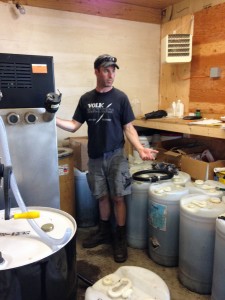
Nick Meyer of North Hardwick Dairy, an Organic Valley milk producer, was able to reduce energy costs and increase self-sufficiency by growing sunflowers for biodiesel and meal while maintaining a wind turbine to help cover electricity needs.
We all know food gives us energy. But we might sometimes lose sight of the amount of energy involved in producing, processing and delivering that food to our plates. Everything requires energy: from tractors plowing and planting to producing fertilizer or compost; from milking cows and keeping that milk cold to storing and transporting vegetables. This energy costs farms real money and it is sometimes a major category of expense. Energy costs are typically one of the highest for farms, rivaling feed costs on dairy farms and labor costs on vegetable farms.
As Vermont experiences growth in food-related businesses and jobs, decisions about energy become more and more important. This has been part of Vermont’s Farm to Plate Strategic Plan and the associated network of people working on implementing that plan. The plan includes goals related to energy, including; reducing farm production expenses, reducing adverse environmental impacts from farm and food system activities, reducing energy use, and increasing renewable energy use in the food system.
One example of how this is actually working is a group called the Farm to Plate Energy Cross Cutting Team: a group of energy specialists from Efficiency Vermont, the Agency of Agriculture, UVM’s Rubenstein School and UVM Extension, The Vermont Bioenergy Initiative, USDA NRCS and private companies. The team meets regularly to learn from each other and take on specific projects such as the recent set of seven “Energy Success Stories” which were released at the 2014 Farm Show, showcasing farms, businesses, vendors, installers, and technical assistance providers who have made a difference with energy efficiency savings and renewable energy production.
Chaired by Efficiency Vermont planning manager, JJ Vandette, the energy team will continue to address the Farm to Plate Efficiency and Renewable Energy Goal to decrease overall food system energy consumption and increase food system renewable energy production and the Farm to Plate Environmental Impacts Goal to decrease adverse environmental impacts from farming and food system activities—while helping to decrease production expenses—also a goal of the Farm to Plate Strategic Plan.
The team is always interested in having new members. If you have an interest in energy, especially energy on farms and in the food system, we’d love to hear from you. JJ Vandette can be reached at jvandette@veic.org or 802.540.7915.
Data sources and analysis at www.vtfarmtoplate.com/getting-to-2020.
2014 was a busy year for the Vermont Bioenergy Initiative as we engaged in national outreach efforts to share our work connecting diversified agriculture and local renewable energy production for on-farm and community use in ways that be applicable to rural areas around the country. These rural areas are often at “the end of the pipeline” and are subject to higher and more volatile costs for energy. The Vermont Bioenergy Initiative “local production for local use” model shows that rural communities can produce some of their own energy, thereby improving their energy security and benefitting from more predictable and affordable energy prices. Any farm in any part of the country can grow and process their own fuel, using the best practices developed by the collaborating farms and UVM Extension researchers working in partnership with the Vermont Bioenergy Initiative. Funding for our program work to support research, technical assistance, and infrastructure development in emerging areas of bioenergy was secured by US Senator Patrick Leahy and the US Department of Energy.
Recent news we distributed to local, regional, and national audiences includes:
Local production for local use is biofuel model that works in Vermont.
Vermont sunflowers to help provide biodiesel power.
We have worked with several regional and national publications to secure editorial specifically featuring oil crops for on-farm biodiesel and feed, and grass energy for heating.
Check out the recent interview with our UVM Extension consultant and agricultural engineer, Chris Callahan in Biofuels Journal.
Read about alternative energy innovations on the farm featuring farms a part of the Farm Fresh Fuel Project in Farming Magazine.
The Grass Energy Report we released summer 2014 was featured extensively in both Renewable Energy World and On Pasture Magazine.
Visit the Green Energy Times website for our ongoing column, Emerging Frontiers in Bioenergy and follow the Vermont Bionenergy on Twitter for current news, trends, and tweets on renewable energy in Vermont and beyond.
16 Feb 2015
Upcoming Farm Energy IQ Training

It’s not too late to register for the upcoming Farm Energy IQ Training for New England Agricultural Service Providers. This training will take place starting Monday, February 23rd at 8:00 a.m. and will end Wednesday February 25 in Fairlee, Vermont. Organized by individuals from the University of Vermont Extension Service, Penn State, and Rutgers University, this three day training is a great opportunity for those interested in on farm energy to learn and apply their skills as well as network with other attendees. The Farm IQ Energy Training is funded generously by Northeast Sustainable Agriculture Research and Education (SARE) Program as part of a regional professional development program to bring the latest developments in the field to individuals who can best apply them.
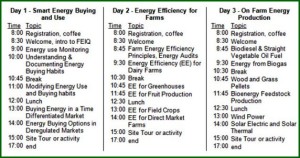
This conference will provide a range of opportunities to learn or improve energy purchasing, calculating, conservation, production, and analysis.Attendees will even have the opportunity to apply skills via hands-on activities and by visiting local operations. Over the three days these lessons will be compared for application on farms in different settings. In addition, attendees will receive a comprehensive binder with all the material covered in the workshops as well as supplemental materials to refresh and share material as well as continue learning.
This conference is a great opportunity to solidify one’s knowledge by learning from on hand specialist and being immersed with in the material. If you happen to miss this particular training, the same workshop will be offered in Pennsylvania, March 10th to the 12th and again in New Jersey from April 8th to the 10th.
Read more about renewable energy events around the country on the Vermont Bioenergy Field Notes blog
- February
- Biomass Boot Camp, February 23, Catonsville, MD
- Farm Energy IQ – Training for NE Ag Service Providers in VT February 23- 25, Fairlee, VT
- ACI’s 4th Carbon Dioxide Utilization Conference 2015 February 25-26 San Antonio, TX
- 2015 Executive Leadership Conference. 25 February – 1 March 2015. Phoenix, Arizona
- March
- World Agri-Tech Investment Summit. March 3-4, 2015 San Francisco, CA
- Waste to Biogas and Clean Fuels Finance and Investment Summit. March 3-4 San Jose, CA
- Farm Energy IQ – Training for NE Ag Service Providers March 10-12, 2015 State College, PA
- Advanced Bioeconomy Leadership Conference March 11-15, 2015 Washington, DC
- Next-Generation Defense Energy Symposium. 17 – 18 March, 2015. Washington, United States
- WEBINAR: Using B100 in Our Class-8 Trucking Operations (60 trucks) in Tennessee March 19, 2015 10:00 AM ET
- ACI’s Annual Lignofuels Americas Summit March 25-26, 2015 Milwaukee, WI
- Forest Products and Timberland Investment Conference. March 31-April 1, 2015. New York, NY
- April
- Applying Renewable Energy – Online Training April 01, 2015 at 09:00 AM to June 30, 2015 at 06:00 PM
- Farm Energy IQ – Training for NE Ag Service Providers in NJ, April 8- 10, Bordentown, NJ
- 5th Defense Renewable Energy Summit. 7-8 April 2015. Arlington, VA
- Good Jobs, Green Jobs 2015 April 13 Washington, D.C
- 2015 Northeast Biomass Heating Expo. April 16-18, 2015. Portland, ME
- Introduction to Renewable Energy Technologies Start date: 20 to 22, 2015
- International Biomass Conference and Expo. 20 -22 April 2015. Minneapolis, MN
- 37th Symposium on Biotechnology for Fuels and Chemicals. April 27 – 30, 2015 San Diego, CA
Bioenergy: Biomass to Biofuels; is an innovative new textbook that provides insight into the potential and current advances and benefits of biofuel. Contributions include an extensive list of well-respected university extension programs, such as The University of Vermont Research Extension, as well as numerous national organizations including the US Department of Energy’s National Renewable Energy Laboratories. The text is edited by Anju Dahiya, cofounder of General Systems Research, LLC and lead biofuels instructor at the University of Vermont’s Rubenstein School of Environment and Natural Resources, both of which stand as leaders in cutting-edge topics such as microbial fuels and biogas. The chapters of the book are divided into solid, liquid and gaseous biofuels, and further explore cost-effective production as well as discussions covering economics, environment and policy.
Organized into seven accessible sections, Bioenergy: Biomass to Biofuels begins with an in-depth overview of the transformation of biomass into biofuels. Once the basics are covered, readers move on to the technical applications of solid feedstocks, such as wood and grass, and their transformation into biofuels. The following section discusses biomass to liquid biofuels—text focuses on oilseeds, cellulose ethanol, and algae as feedstocks. Anaerobic digestion is explored in a section outlining gaseous fuels and bioelectricity and focuses primarily on livestock manure feedstocks. Throughout the chapters, the tradeoffs and benefits of these different feedstocks are outlined through deeper analysis.
Multiple chapters focus in detail on conversion pathways for cost effective biofuel production. The myriad of topics include basic biodiesel production efficiency, converting petroleum-based infrastructure into biorefineries, reducing enzyme cost through varying combinations, and sustainable aviation biofuels. The text concludes with a robust section that connects biofuels to a big picture perspective—economics, sustainability, environmental implications, and policy are examined closely in relation to renewable resources, future uncertainties, and entrepreneurship.
Bioenergy: Biomass to Biofuels is structured to meet the needs of professionals finding their way in the field, students in need of an introduction, and instructors establishing a course on biofuels. Case studies on provided topics are found at the end of every section and are based on documented implementation projects. Bioenergy: Biomass to Biofuels is available for purchase on the Elsevier publisher website. Editor Anju Dahiya, owner of General Systems Research in Burlington, Vermont and is a Vermont Bioenergy Initiative grant recipient to advance research and applications of converting algae into biofuel.
Eat It, Drink It, Feed It, Fuel It:
By: Debra Heleba, University of Vermont Extension agriculture coordinator
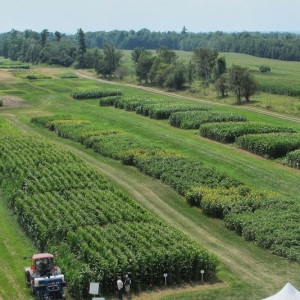 Since 2003, the University of Vermont Extension Northwest Crops and Soils program (NWCS) has been conducting on-farm research on a wide range of crops-from cereal grains and forages to hops and oilseeds-to provide farmers and end-users with agronomic information that supports human food and beverage markets, as well as local livestock feed and biofuel production.
Since 2003, the University of Vermont Extension Northwest Crops and Soils program (NWCS) has been conducting on-farm research on a wide range of crops-from cereal grains and forages to hops and oilseeds-to provide farmers and end-users with agronomic information that supports human food and beverage markets, as well as local livestock feed and biofuel production.
Dr. Heather Darby, Extension Agronomic and Soils Specialist, leads NWCS. As a farmer herself, she understands the importance of conducting research locally. “One of the most important reasons for conducting research at a land grant university is to answer the questions that are coming from the community around you,” states Darby. To that end, NWCS brings together farmers and end-users of their products (bakers and brewers, for example) in every step of the research process, from identifying production barriers and developing research questions to implementing trials and sharing the results on-farm. This team approach has allowed NWCS to successfully address goals outlined in Vermont’s Farm to Plate Strategic Plan. Here are just a few examples:
• Toward Vermont’s Farm to Plate goal to increase the overall amount of food produced in Vermont, NWCS conducts variety trials of wheat, barley, and hops. It also created a grains and hops testing lab to ensure high quality, safe local products. Several bakeries are now using Vermont-grown wheat and nine Vermont breweries are using locally grown hops.
• NWCS research on cover crops and home-grown livestock forages as well as its nutrient management planning education have helped dairy farmers reduce off-farm fertilizer and livestock feed purchases moving toward Vermont’s goal to decrease adverse environmental impacts from farming and food system activities and the goal to increase dairy farm viability. Results from a 2010 NWCS survey suggest that through the development of nutrient management plans, Vermont dairy farms have reduced phosphorus additions on their farms by an average of 50% and have implemented cover cropping and other conservation practices.
• Toward the Farm to Plate goal to increase food system renewable energy sources, NWCS research and outreach projects in partnership with the Vermont Bioenergy Initiative on sunflower, soybean and canola crops have sought to build on-farm energy independence; more than 24 farms are now growing their own oilseed crops for fuel, feed, and fertilizers.
To learn more about NWCS and its research to date, visit www.uvm.edu/extension/cropsoil.
Beautiful fields of sunflowers growing in Newbury and Shaftsbury, Vermont will have an unusual future: the flowers’ seeds will be converted to biodiesel and livestock feed. The fuel will be used in Green Mountain Power’s fleet of vehicles and for building heating, saving Green Mountain Power customers money and reducing greenhouse gas emissions and other pollutants. The feed will be used on Vermont farms to supplement animal nutrition.
“Green Mountain Power is leading the way in many local energy initiatives,” said Green Mountain Power President and CEO Mary Powell. “Using Vermont sunflowers to power our vehicles and heat our buildings is a beautiful way to keep our energy local and clean.”
Twenty acres of sunflowers are growing at the State Line Farm Biofuels in Shaftsbury and another ten acres are growing at the Ekolott Farm in Newbury. When the oilseeds are harvested this fall, they will be dried and pressed, then the raw oil will be converted to biodiesel, or B100. The solid portion of the seed, the meal, is valuable as a livestock feed. Depending on the crops’ success, the cost of fuel to Green Mountain Power could be up to one dollar less than current B100 prices.
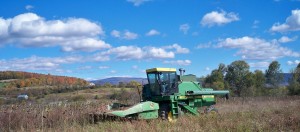
Sunflowers being harvested at State Line Biofuel Farm in Shaftsbury VT
“It is so great to be part of this innovative test with GMP,” said John Williamson of State Line Farm Biofuels. “Projects like this really help support farmers, plus it’s beautiful to see the fields of sunflowers and even more beautiful to realize it will provide a clean and local power source.”
This pilot is a partnership between Green Mountain Power, UVM Extension, and the Vermont Bioenergy Initiative. UVM Extension and the Vermont Bioenergy Initiative have worked together for several years to encourage the growth of oil seeds as an energy source and the addition of Green Mountain Power is hoped to accelerate this effort even further.
“As a result of the Vermont Bioenergy Initiative, several pioneering farmers in Vermont now have the necessary infrastructure to produce sustainable biodiesel,” notes Chris Callahan, UVM Extension Agricultural Engineer. “This is a unique model: local production for local use. The partnership with Green Mountain Power means more gallons will be made which means lower cost for everyone.”
“The goal is for local biodiesel production to both shave fuel costs for our customers while helping to develop new markets for locally produced liquid fuels,” said Powell. “We see this benefiting local farms and customers as we work together to provide more clean cost-effective and reliable power.”
###
About Green Mountain Power
Green Mountain Power (GMP) serves approximately 265,000 residential and business customers in Vermont and has a vision to be the best small company in America by empowering customers to save money and move to clean energy sources. GMP recognizes the role of electric utilities is changing and is focused on a new way of doing business to meet the needs of customers with integrated services, while continuing to generate clean, cost-effective and reliable power in Vermont. In 2014, Vote Solar named GMP a Solar Champion. More information at: www.greenmountainpower.com.
About the Vermont Bioenergy Initiative
A program of the Vermont Sustainable Jobs Fund, the Vermont Bioenergy Initiative connects diversified agriculture and local renewable energy production for on-farm and community use by supporting research, technical assistance, and infrastructure development in emerging areas of bioenergy including biodiesel production and distribution for heating and transportation, oil crops for on-farm biodiesel and feed, grass for heating, and algae production for biofuels and wastewater management. More information at: www.VermontBioenergy.com.




